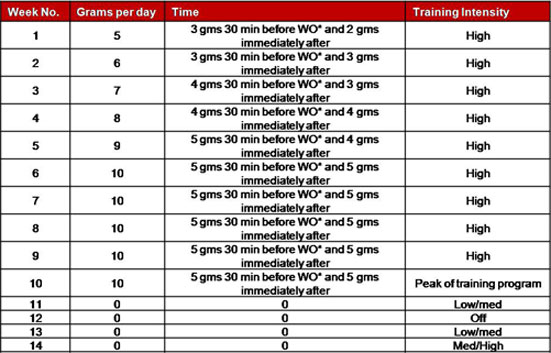Answer: Creatine monohydrate (CrM) is one of the most widely used supplements to improve sports performance, muscle size, strength and power. Various supplement strategies have been recommended to be beneficial for increasing muscle creatine stores. The “loading phase” is the most common and often suggested method used in CrM supplementation. Ingesting approximately five grams of CrM four times a day for one week and 3-5 grams thereafter has shown a 10-40% increase in muscle stores of CrM. However, newer research has led to an alternate and equally effective loading method. Long-term studies using low dosages (5 to 6 grams for 10 to 12 weeks, no loading phase) resulted in significant increases in strength and muscle size when combined with resistance training. Muscle size and strength gains also occur more gradually with this latter protocol.
If the goal is strictly bulking up and you are not in a “time crunch” the Gradual Creatine Loading Strategy may be best for you.
Gradual Creatine Loading Strategy
• Users can start slowly to maximize absorption and to let their connective tissue and muscle repair keep up with strength increases to avoid injury
• Begin with 5 grams 30-45 minutes before exercise with approximately 25 to 45 g of carbohydrate (depending on size)
• Add 1 to 2.5 grams to your daily intake each week until a benefit/gain is no longer realized (see example below).
Gradual Creatine Loading Example

*To maximize creatine storage follow the post WO dose strategy along with your favorite post-workout meal replacement powder or bar
If you are looking for the benefits of creatine to occur more rapidly or need a boost in performance for an upcoming athletic event or game you may wish to use the Rapid Creatine Loading Strategy below:
Rapid Creatine Loading Strategy
• Loading phase: For the first 5 days take 5 grams, four times daily with approximately 25 to 45 g of carbohydrate (depending on size) to maximize creatine storage
• From day 5 onward, ingest 5 grams (2.5 grams pre-exercise and 2.5 grams post-exercise) daily
Ultimately a user’s terminal/maintenance dose will depend on goal and personal preference. Creatine loading is personal and varies based on a user’s physiological state. A minimum of 5 grams daily may maintain desired levels for many users and up to 15 grams daily is not uncommon for larger individuals.